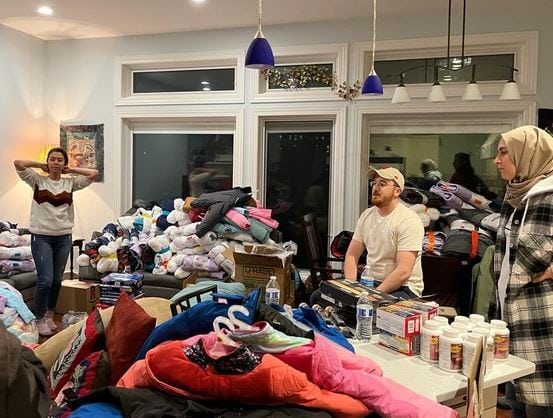College of Public Health Students, Employees Help Provide Relief for Victims of Earthquakes in Turkey
| A student from the University of Arkansas for Medical Sciences (UAMS) Fay W. Boozman College of Public Health, along with faculty and staff from the Arkansas Center of Birth Defects Research and Prevention and Department of Epidemiology, participated in a project to assist the people in Turkey affected by a 7.8-magnitude earthquake.
Emine Bircan, a native of Kayseri, Turkey, is a graduate research assistant in the center who’s pursuing a doctorate in epidemiology.
Bircan’s hometown is not far from the area most impacted by the earthquake.
Turkey is located on several fault lines, so it’s normal for the country to experience an earthquake of some manner. But what unfolded in February is abnormal.
“The biggest of the earthquakes was historic because it was the deadliest — and affected 11 cities at the same time,” Bircan said. “There are so many people right now who are homeless.”
Bircan admitted that it’s tough for her to focus, as there have been more than 46,000 casualties linked to the earthquake and aftershocks.
“At one point, I was emotionally distressed,” Bircan said. “That emotion was combined with a feeling helplessness as I’m physically overseas here in the U.S.”
Unbeknownst to Bircan, her regular biweekly meeting with Wendy Nembhard, Ph.D., MPH, director of the birth defects center, professor and chair of the Department of Epidemiology, would help address the helplessness. Nembhard asked Bircan how things were going for her family. Bircan then revealed how her family was OK, but things are dire for a lot of people in Turkey — and that she wanted to do something to help. When Nembhard learned what organization Bircan desired to work with for a relief project, the professor knew the center and department had to act.

Some of the baby food and formula collected by the Arkansas Center of Birth Defects Research and Prevention and Department of Epidemiology.
Bircan and Nembhard started a donation drive, which raised nearly $1,300 in less than a week. Organizers used the funds to purchase baby food, baby formula and other items specifically for infants and toddlers.
“There are few resources that the parents of the children in Turkey can use to meet their child’s needs at the time,” Bircan said. “Purchasing and sending supplies for children is way to helping improve their lives of so many families.”
“Our Center helps families, not just through our research, but also with volunteering in the community and donating money and other essential items to families living below the federal poverty line,” Nembhard said. “I knew that once our team heard about this situation in Turkey, they’d want to help — because that’s what we do.”
Following the lead of other Turkish community organizations throughout the globe, Bircan knew exactly what entity that would properly deliver the collected goods to the people in need.
“The Turkish Embassy is who we worked with,” she said. “We choose to collaborate with the embassy because they’re reputable and quickly send out supplies to the impacted areas.
“I’m grateful for the donations. This big disaster will require continued help as so many people are facing overwhelming devastation on all levels including, but not limited to, basic needs, medical needs and rebuilding of homes.”
Nembhard said the manner in which faculty and staff responded on such short notice is a reflection of the impact public health can make. Nembhard also noted that people are more connected than we often realize.
“I’m pleased that we came together for such a worthy cause,” she said. “We’re all the same. Hungry children and homeless families feel the same pain, regardless of their race, ethnicity, political affiliation, religion or location. We must remember that, especially in the realm of public health.”
Nembhard, and her team, rely heavily on the community to assist with their projects. Now it was their turn to allow the community to depend on them for assistance.
“We always ask people to participate in our studies, we generate important information from the data they give to us and the stories they tell us,” Nembhard said. “We have to always do something with that knowledge to help our communities — even if the communities are halfway around the world in Turkey. We all went into public health to make a difference. This was another opportunity to make a difference.”
